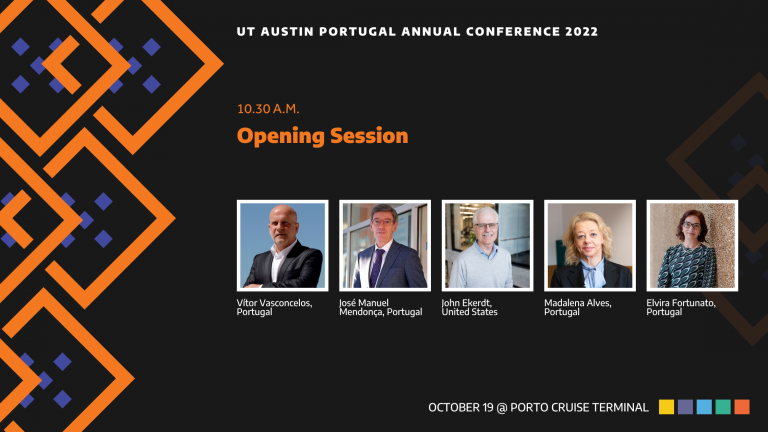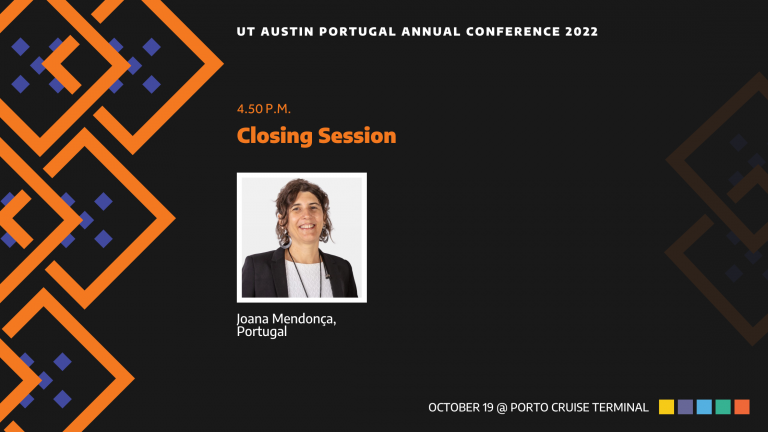2022 Annual Conference - UT Austin Portugal (original) (raw)
About the Thematic Sessions
Opening Session
With: Vítor Vasconcelos (CIIMAR), José Manuel Mendonça (UT Austin Portugal – Portugal), John Ekerdt (UT Austin Portugal – UT Austin), Madalena Alves (FCT) and Elvira Fortunato (Ministry of Science and Technology of Portugal)

International S&T Partnerships: Platforms of Science Diplomacy
With: Amélia Polónia (FCT), Elsa Henriques (Luso-American Development Foundation), Sona Ramesh (United States Embassy Lisbon), Tim Flink (German Parliament) and Luís Lacerda (University College London).
This round table will set the tone of this year’s Conference.
High-calibre discussants from different sectors are invited on board to discuss the role of science and technology in diplomatic action and policymaking, particularly in support of tackling critical global challenges.
FCT’s joint venture with the University of Texas at Austin will certainly provide an opportunity for discussants to elaborate on the importance of similar initiatives to enhance international scientific cooperation and strengthen interdisciplinary collective responses to societal missions.

Contributions of a 15-Year UT Austin Portugal Program to Intelligent Biomaterials for Treatment of Autoimmune Diseases and Cancer
Keynote Speaker: Nicholas A Peppas, Sc.D.
Cockrell Family Regents Chair in Engineering
Director, Institute of Biomaterials, Drug Delivery and Regenerative Medicine
McKetta Department of Chemical Engineering, Department of Biomedical Engineering,
Departments of Pediatrics, Surgery and Perioperative Care, Dell Medical School,
and Division of Molecular Pharmaceutics and Drug Delivery, College of Pharmacy
The University of Texas at Austin
Austin, TX 78712, USA
Host: Helena Florindo Head of the BioNanoSciences, Drug Delivery & Immunoengineering Research Group Research Institute for Medicines (iMed.ULisboa)
Abstract: Engineering the molecular design of intelligent biomaterials by controlling structure, recognition and specificity is the first step in coordinating and duplicating complex biological and physiological processes.
Recent developments in siRNA and protein delivery have been directed towards the preparation of targeted formulations for protein delivery to specific sites, use of environmentally-responsive polymers to achieve pH- or temperature-triggered delivery, usually in modulated mode, and improvement of the behavior of their mucoadhesive behavior and cell recognition.
We address design and synthesis characteristics of novel crosslinked networks capable of protein release as well as artificial molecular structures capable of specific molecular recognition of biological molecules. Molecular imprinting and microimprinting techniques, which create stereospecific three-dimensional binding cavities based on a biological compound of interest, can lead to the preparation of biomimetic materials for intelligent drug delivery, drug targeting, and tissue engineering.
We have been successful in synthesizing novel glucose- and protein-binding molecules based on non-covalent directed interactions formed via molecular imprinting techniques within aqueous media. We have also developed structurally superior materials to serve as effective carriers for siRNA delivery to combat Crohn disease and ulcerative colitis.

UT Austin Portugal's Footprint in Technology Commercialization
With Verónica Orvalho (Didimo), Marta Catarino (University of Minho), Maria Oliveira (UPTEC, University of Porto), Pedro Bizarro (Feedzai) and Marco Bravo (UT Austin Portugal). Other discussants to be confirmed soon.
UT Austin Portugal, particularly with its University-Technology-Enterprise Network (UTEN), has generated a deep and significant economic and social impact in Portugal through training and business development activities.
From 2007 to 2012, through the development of a country-wide network of technology transfer offices and professionals, UTEN’s actions have contributed, at the university level in Portugal, to a 20% increase in patents granted per year, 26% rise in executed licenses per year, a staggering 137% of increased licensing income, and 132% more new academic spinoff companies, 37% of which exported technology to the world, growing at an average annual rate of 127% in revenue.
From 2012 to 2016, with the creation of the Global Startup Program, UTEN had an overall economic impact of 95million,translatedintoventurecapitalcapturedfromU.S.investors,sales,andtrials.ThreePortuguesecompanieshavebeenspunoutbydirectprogramactions,andtheseventuresgenerated67qualifiedjobswitha95 million, translated into venture capital captured from U.S. investors, sales, and trials. Three Portuguese companies have been spun out by direct program actions, and these ventures generated 67 qualified jobs with a 95million,translatedintoventurecapitalcapturedfromU.S.investors,sales,andtrials.ThreePortuguesecompanieshavebeenspunoutbydirectprogramactions,andtheseventuresgenerated67qualifiedjobswitha35 million wage impact in Portugal.
The total economic impact of this initiative during this period raised 130million,meaningthatUTEN’sactionsreturned130 million, meaning that UTEN’s actions returned 130million,meaningthatUTEN’sactionsreturned40 for every dollar invested by FCT in the Program.
This round table brings together national talent acknowledged internationally in their areas who have participated in some of the Program’s research, technology commercialization and entrepreneurial activities to discuss the Program’s contribution to Portugal’s current vibrant entrepreneurial and innovation ecosystem.

A Look to the Future: Clean Energy and the UN Sustainable Goals - Notes from the Program's Community
With Brian Korgel (Energy Institute, UT Austin), João A. Peças Lopes (University of Porto), João P. Matos Fernandes (University of Porto) and Adriano Cerqueira (Antena 1, RTP).
The impact of human activity on climate has never been so perceptible: in 2021, we saw fast-burning wildfires ravaging California, Greece and Turkey, while torrential rainfalls were sweeping away villages in Germany in high Summer; this year, Portugal’s entire territory was put on red alert, as an unprecedented heatwave hit the country, bringing to memory the deadly fires that broke several communities in 2017; ice caps melting in the Poles at a fast pace and carrying water into the ocean put coastal towns and villages on alert for potentially devastating floods. The last decade was the warmest ever recorded, with temperatures reaching extreme levels worldwide, triggering unprecedented natural hazards.
The alarms went off, and there is a fierce urgency to transition to a net-zero economy. It’s now or never, some experts warn.
As we celebrate the Partnership’s accomplishments over the last 15 years, it’s time to take stock of the knowledge produced by some of the Program’s Scientific Areas and understand whether the Program should be tapping more explicitly into research and innovation for the energy transition.
We have invited three world-class experts from our community to discuss what Portugal and Texas, through The University of Texas at Austin, can learn from each other regarding Clean Energy and together contribute to ensuring Access to Affordable, Reliable, Sustainable and Modern Energy for All, one of the 2030 United Nation’s Sustainable Development Goals.

Closing Session
With: Joana Mendonça (ANI)
